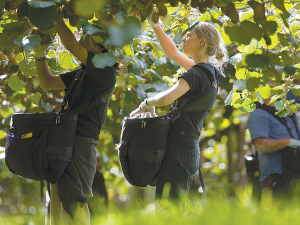NZ scientists make breakthrough in Facial Eczema research
A significant breakthrough in understanding facial eczema (FE) in livestock brings New Zealand closer to reducing the disease’s devastating impact on farmers, animals, and rural communities.
 Te Puke is famed as New Zealand’s kiwifruit capital, but new research could mean that top spot is contested in the future.
Te Puke is famed as New Zealand’s kiwifruit capital, but new research could mean that top spot is contested in the future.
Te Puke is famed as New Zealand’s kiwifruit capital, but new research could mean that top spot is contested in the future, with suitable kiwifruit production land identified in Waikato, Taranaki and the top of the South Island.
Information about the land use suitability and production potential of a wide variety of crops became much easier to find today, with the launch of the Data Supermarket.
The Data Supermarket is a new online storehouse of data about the ingredients, food and fibre New Zealand can grow now and in the future.
It includes information about a wide array of vegetable, fruit, arable, animal, plant and tree crops, plus climate and economic data.
The datasets were created between 2020 and 2023, and the range is still growing, with researchers creating and curating environmental, economic, social and cultural information for different land use options.
Dr Robyn Dynes, research lead at AgResearch, says the goal of the Data Supermarket is to assist the primary sector to identify a greater range of suitable land opportunities.
“We know we can grow a much greater range of food and fibre in New Zealand. But the question has been: what will grow well, where? Our research aims to help people answer that,” she says.
The data repository contains a wide range of datasets with information on suitability, yield maps, climate change impacts and economic information.
“Farm advisors with good technical skills will be able to use the data to create a short-list of potential land-use options that may be feasible, for their clients to consider as candidates for in-depth business cases from local experts,” says Dynes.
“Our hope is that by bringing these datasets together and providing open access, innovators will also see potential to create new tools.”
The datasets were produced by a team of researchers from multiple institutes and scientific disciplines as part of the Land Use Opportunities: Whitiwhiti Ora research programme funded by the Our Land and Water National Science Challenge.
The data is available to all those planning or providing advice on land-use options in New Zealand.
The Data Supermarket is now accessible at https://landuseopportunities.nz.
Agrisea NZ has appointed Craig Hudson as it's new chief growth officer.
State farmer Landcorp, trading as Pamu, is a forecasting a full-year net profit of around $100 million.
Tony Aitken, chief executive of Ruralco, has been awarded the Excellence in Business Leadership Award at the ANZ Business of the Year Awards.
Global trade has been thrown into another bout of uncertainty following the overnight ruling by US Supreme Court, striking down President Donald Trump's decision to impose additional tariffs on trading partners.
Controls on the movement of fruit and vegetables in the Auckland suburb of Mt Roskill have been lifted.
Fonterra farmer shareholders and unit holders are in line for another payment in April.

OPINION: Here w go: the election date is set for November 7 and the politicians are out of the gate…
OPINION: ECan data was released a few days ago showing Canterbury farmers have made “giant strides on environmental performance”.